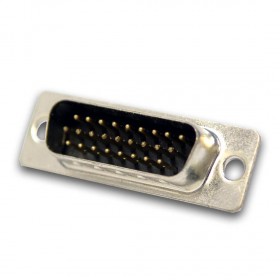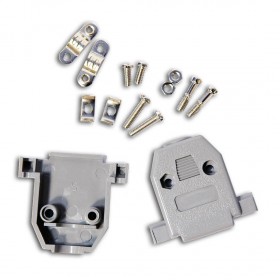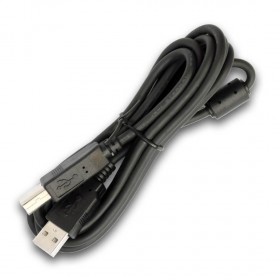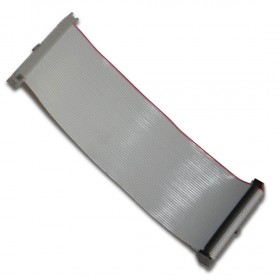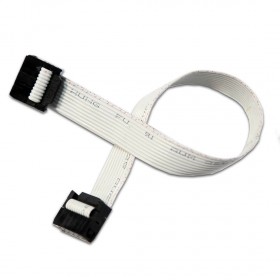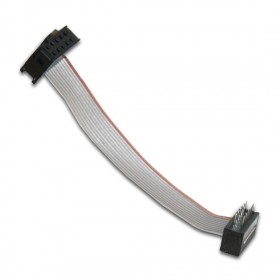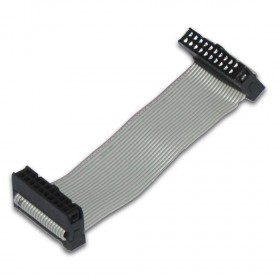- Features
-
Key Features
- USB to SPI master interface with configurable phase, polarity and frequency (up to 48MHz);
- USB to SPI Flash interface
- USB to I2C master interface with configurable frequency (up to 1MHz);
- USB to UART interface;
- 48 digital I/O pins with debounce filter, open drain functionality and embedded pull-up resistors;
- 8 analog inputs with event-driven interface;
- 4 PWM outputs with configurable frequency and duty cycle;
- 3 Pulse and frequency counters with event-driven interface;
- 1 status LED and 2 user-configurable LED's;
- no hidden fees: API, updates, software and technical support are free;
- USB 2.0 high-speed (480 MHz) interface with Plug-and-Play detection and notification;
- RoHS Compliant
Event-Driven Interface
There are two approaches to monitor user actions (e.g. key presses) or sensor measurements. Your application can either poll for changes or react on events.
Here is an example that will help us understand the difference.
Let us assume that our application must notify a user if a voltage level monitored by the DLN-4M adapter is out of the predefined range.
Our application can poll the DLN-4M adapter periodically to check the digital input value. You would have to decide how frequently you need to poll this input. If you poll it too frequently, you unreasonably waste computer resources and USB bandwidth. If you poll it rarely, you can’t react on the changes in a timely manner.
Another approach is to configure the DLN-4M adapter to notify your application when the voltage level crosses the threshold. You application can perform other tasks instead of continuously polling the device. When the voltage level crosses the threshold, the DLN-4M adapter sends an event with current measurements to your application.
The polling approach wastes computer resources and USB bandwidth, while the event-driven interface facilitates more responsiveness.
- Specifications
-
Electrical Characteristics
Absolute Maximum Ratings:
Parameter Min Max Storage Temperature -60°C +150°C Ambient Temperature Under Bias -40°C +85°C DC Input Voltage to Any Pin -0.3V +4.0V Operating Conditions:
Parameter Min Max Ta (Ambient Temperature Under Bias) 0°C +70°C DC Current VCC and GND Pins 50mA GPIO Characteristics:
Symbol Parameter Condition Min Max VIH Input High Voltage 2.31V 3.6V VIL Input Low Voltage -0.3V 0.99V VOH Output High Voltage IOUT= 2.0mA 2.9V VOL Output Low Voltage IOUT= -2.0mA 0.4V IL Input Leakage Current I/O Pin 0.001mA IDC DC Current per I/O Pin 3.0V<VDDIO<3.6V; VOH=2.2V 9mA SPI Interface Characteristics:
Symbol Parameter Condition Min Max VIH Input High Voltage 2.31V 3.6V VIL Input Low Voltage -0.3V 0.99V VOH Output High Voltage IOUT= 2.0mA 2.9V VOL Output Low Voltage IOUT= -2.0mA 0.4V Freq SPI Bus Frequency configurable 376 kHz 48 MHz I2C Interface Charachteristics:
Symbol Parameter Condition Min Max VIH Input High Voltage 2.31V 3.6V VIL Input Low Voltage -0.3V 0.99V VOHi Output High Voltage Internal VCC 2.9V VOHe Output High Voltage External VCC (VCC-0.4)V VOL Output Low Voltage 0.4V Freq I2C Bus Frequency configurable 1470 Hz 400 kHz * * Frequencies of up to 1 Mhz are supported. However, due to GPIO DC current limitations, the necessary size of pull-up resistors cannot be ensured.
- Documentation and Downloads
-
Documentation & Online Support
Development
Title Links Description C/C++ API 
C/C++ API desription. .NET API 
API description for .NET development. LabView Instrument Driver DLN LabView Driver is included in MS Windows dln.3.4.0.exe[zip] setup package Hardware Information
Software
- Reviews
-

